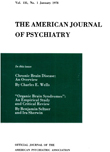LIGHTER FLUID "SNIFFING"
Abstract
This report pertains to 12 cases, 10 boys and two girls between the ages of 8 and 16, who sniffed lighter fluid to the point of euphoria and intoxication. All 12 had been arrested prior to the sniffing and charged with delinquent activities such as stealing, truancy and destruction of property. The euphoria from sniffing did not appear to lead directly to anti-social behavior although two of the boys were frequently arrested for shoplifting the fluid. Most of the children while sniffing were involved in some sexual activities, singly or in groups and homosexual or heterosexual in nature. In these instances the effects of the sniffing did appear to stimulate erotic phantasies and behavior. Most of the boys had poor school performance and learning difficulties related in part to their restlessness and truancy. Their general behavioral patterns showed a marked tendency toward impulsivity and overactivity. Thus it would appear that this group is oriented more towards a nonverbal, action-centered adaptation. Five of the boys had sniffed continuously from one to 3 years and were considered addicted; 3 had also become alcoholic. In spite of efforts by the families, Juvenile Courts, Probation Officers and social agencies, the sniffing and drinking persisted. Finally these 5 had to be committed to the State Training School in order to stop the addiction.
In any discussion of early childhood, the maternal attitude, the mother-child relationship and the mother's ability to meet early oral needs are well known to be of crucial importance. In a developmental scheme, the nose, however, is often neglected but as Fenichel(5) points out, it is a very important pregenital, erotogenic zone, linked closely with mouth and oral cavity for the gratification of early pleasurable needs. Depending upon the balance and harmony between gratification and frustration, the child grows to relinquish the more pregenital excitements and to strive toward more mature adaptations and healthy ego ideals(12). In these children who sniff, particularly those who became addicted, this transition from earlier narcissistic pleasures to more mature forms of adaptation and ego ideals did not appear to have taken place.
The families of the 5 boys who were addicted were all split by marital discord. The fathers were alcoholic, the mothers immature and masochistically oriented. The Mexican-American background added further problems of acculturation and low socio-economic status. This environment made it difficult for the children to meet their early oral needs so there was a continuation into latency and adolescence of a search for the fulfillment of early narcissistic gratification. They no longer had a feeling of hope that their dreams and expectations would come true. The defiance toward authority figures such as expressed in delinquent acts indicates their feelings that the environment has "let them down" (1).
The etiology of sniffing from this sample of children appears to be multi-determined: 1. The ease of accessibility, 2. Social, group and ethnic pressures, 3. Early emotional deprivation, 4. Failure of development of mature ego patterns which lead to delay in gratifications, and 5. Lack of transformation of early narcissistic desires into more socially acceptable ego ideal standards.
Up to the present time the social agencies' and Juvenile Court's methods of controlling the longstanding "sniffers" who can be considered addicted have not been successful. Each of the 5 boys addicted were finally admitted to State Training School. For these children, such an easily obtainable item as lighter fluid will provide a dream world of euphoria where mature ego ideals are forfeited and replaced by expectations that the earliest narcissistic gratifications will be forthcoming.
Access content
To read the fulltext, please use one of the options below to sign in or purchase access.- Personal login
- Institutional Login
- Sign in via OpenAthens
- Register for access
-
Please login/register if you wish to pair your device and check access availability.
Not a subscriber?
PsychiatryOnline subscription options offer access to the DSM-5 library, books, journals, CME, and patient resources. This all-in-one virtual library provides psychiatrists and mental health professionals with key resources for diagnosis, treatment, research, and professional development.
Need more help? PsychiatryOnline Customer Service may be reached by emailing [email protected] or by calling 800-368-5777 (in the U.S.) or 703-907-7322 (outside the U.S.).



